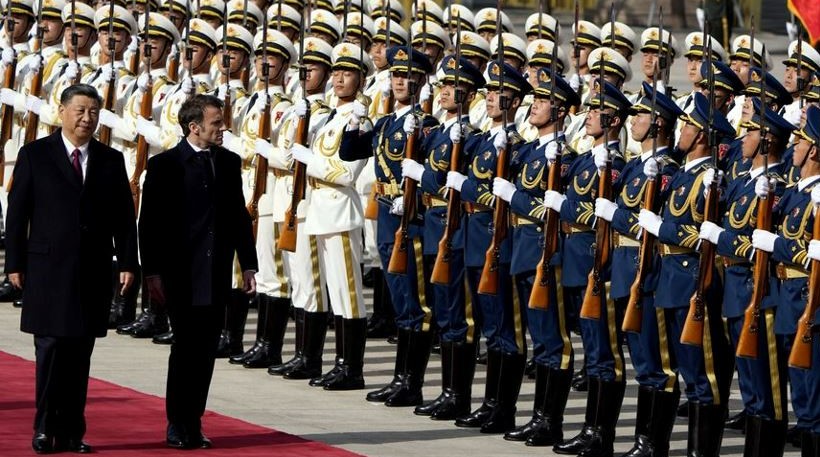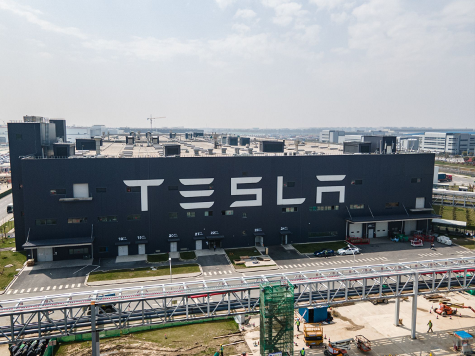FORGET MACRON – US AND EUROPE SEE EYE-TO-EYE ON CHINA
In its geopolitical competition with the West, China has long sought to divide the U.S. from Europe. Last week it appeared to score a coup when French President Emmanuel Macron declared Europe wouldn’t follow the U.S.’s approach toward Beijing.
Appearances, though, are deceiving. In fact, the European Union has decisively changed its approach to China in the past year. Europeans use milder language than Americans, saying they wish to “de-risk” their economic relationship with China, not “decouple.”
But in substance, European de-risking and American decoupling look much the same. Indeed, Europe is erecting economic defenses against China that in some cases go further than the U.S.
The convergence between Europe and the U.S. can easily be overlooked because of the absence of any coordination. Indeed, some European steps such as support for critical minerals and semiconductors are as much a reaction to the U.S. as Chinese industrial policy.
In Washington last week, Western leaders worried their mutual concern with China could degenerate into protectionism against each other.
Unfortunately for China, Europe’s assertive posture probably has more staying power precisely because it doesn’t reflect submission to U.S. leadership. Rather, it results from Europe’s own re-evaluation of China’s strategic and ideological direction, most of all its support for Russia since its invasion of Ukraine.
The U.S. and Europe arrived at this point through a “parallel process,” said Mikko Huotari, executive director of the Mercator Institute for Chinese Studies, a Berlin-based think tank. “At the end of day what brings us together is China’s actions: on Taiwan, on Russia, and internally, its trade and investment actions.”
The lack of coordination was on full display last week when Mr. Macron, returning from a meeting with Chinese President Xi Jinping in Beijing, told reporters that “the worst of things would be to think that we Europeans must be followers” of the U.S. when it comes to Taiwan, a self-governing island the communist-ruled mainland claims as its territory.
The remarks triggered much public criticism, but privately Western officials and diplomats were unruffled. They saw Mr. Macron as hewing to a French tradition dating back to Charles de Gaulle of advocating European independence from the U.S. in foreign policy.
They also thought Mr. Macron made a valid point: Don’t turn up the heat with China through gestures that don’t actually make Taiwan safer, such as former House of Representatives Speaker Nancy Pelosi’s visit last summer.
To underscore its support for the status quo, France sent a frigate through the Taiwan Strait as the Chinese military launched exercises to intimidate the island.
To understand Europe’s new thinking on China, read a speech by European Commission President Ursula von der Leyen delivered March 30 just before traveling with Mr. Macron to China. Parts could have been written by President Biden’s National Security Council.
“The Chinese Communist Party’s clear goal is a systemic change of the international order with China at its center,” Ms. von der Leyen said. “We need to ensure that our companies’ capital, expertise and knowledge are not used to enhance the military and intelligence capabilities of those who are also systemic rivals.”
Thus, Europe has in recent years erected a series of defenses against China. A partial list:
*The EU walked away from an investment treaty finalized with Beijing in 2020;
*The EU enacted a “foreign subsidies regulation” to investigate and punish government aid to foreign competitors;
*And agreed on an “economic coercion instrument” to deter actions such as China’s embargo of imports from Lithuania over the opening of a Taiwan representative office there (the U.S. has no such law yet).
The EU is also working on a law setting targets for domestic production and processing of critical raw materials such as rare earth elements, used in electronics, magnets and renewable energy, 98% of which come from China.
Thanks to prior EU support, “we will see some nodes of the supply chain spurt up over the next three years, and an alternative rare earth permanent magnet supply chain for electric vehicles in Europe by the decade’s end,” said Luke Patey, an expert on European-Chinese economic relations at the Danish Institute for International Studies.
European governments now regularly block Chinese investment into sensitive sectors; Italy has done so repeatedly in the past two years, Germany last fall did so twice.
In 2020, more than half the equipment in 16 of 31 countries’ 4G networks came from Chinese suppliers such as Huawei Technologies Co., according to Strand Consult. With 5G, that’s true of just eight countries, Strand said.
Still, both Europe and the U.S. will find that decoupling depends not just on policies but on companies, who are motivated by sales, not ideology. While multinationals want to hedge their China exposure, few can turn away completely, and some are doubling down.
Tesla will make 40% to 50% of its cars in China this year, according to Michael Dunne, founder of ZoZoGo LLC, an auto consulting firm. By bringing its supply chain to China, Tesla invigorated domestic rivals who are now swallowing its market share, Mr. Dunne said. Yet Tesla is betting further on China, announcing this month a factory in Shanghai to make Megapack high-capacity storage batteries. (We don’t see Elon bragging much about this on Twitter, do we?)
China is determined to make decoupling as difficult as possible for multinationals. It is approving mergers of American semiconductor companies only if they make available in China products they sell in other countries, to counter U.S. export controls.
During Mr. Macron’s visit to China, Airbus SE announced it was opening a second final assembly line there. While such investments are necessary to secure sales, Airbus has stuck to assembling narrow-body, not wide-body jets, where China thus far lacks indigenous capability.
Airbus “knows the day they share their technology, they will have a Chinese twin with the same technology and China will push them out very quickly,” a European official said. Doesn’t Elon know this too?
Greg Ip is the Chief Economics Commentator at the Wall Street Journal



